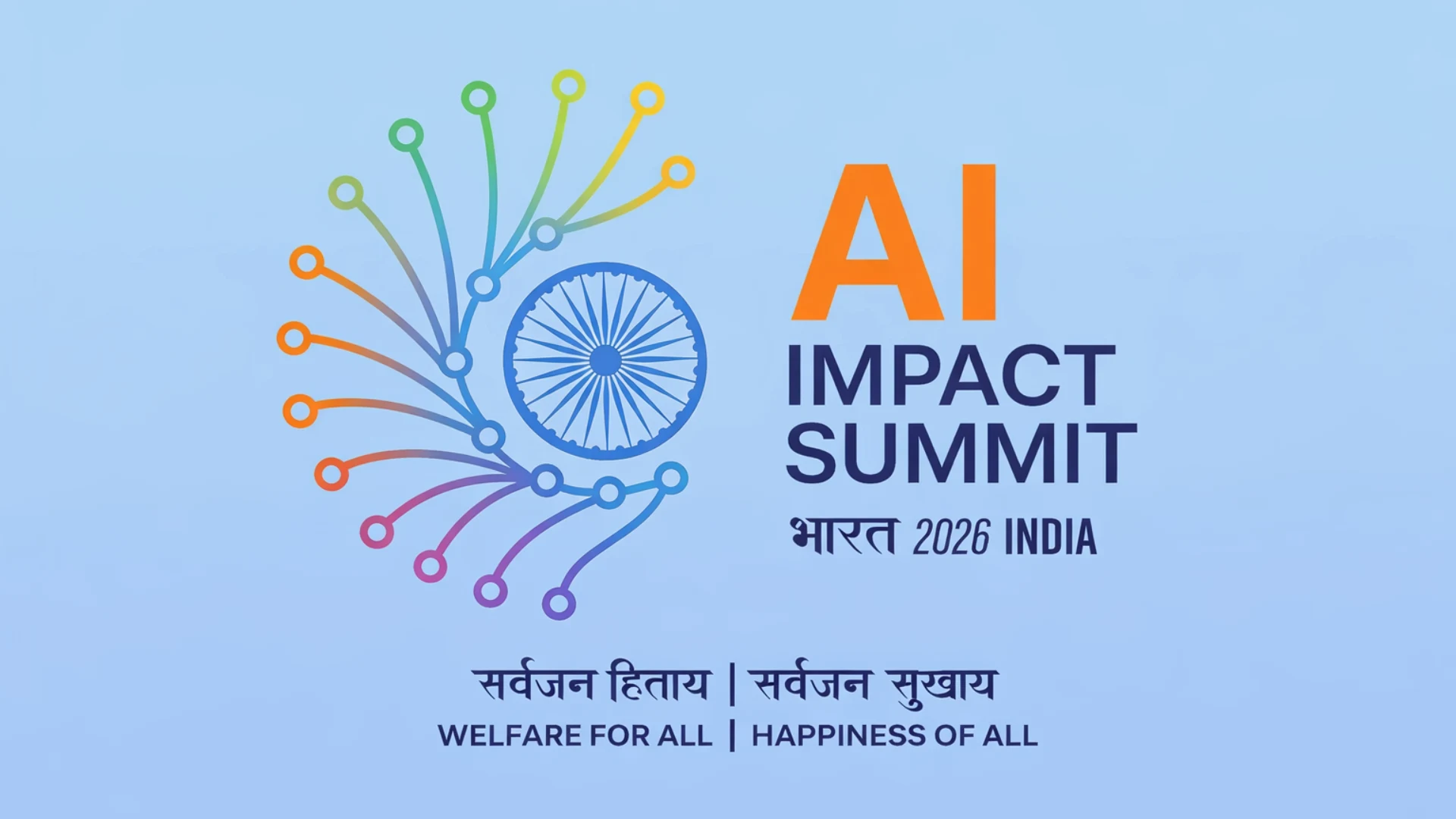Key Takeaways
- A block header is the metadata section of a blockchain block that contains critical information like the previous block hash, Merkle root, timestamp, nonce, and difficulty target.
- Hash functions within block headers create unique digital fingerprints that make data tampering practically impossible to hide.
- Block headers form the backbone of blockchain security by cryptographically linking each block to the one before it, creating an unbreakable chain.
- Consensus mechanisms such as Proof of Work and Proof of Stake rely directly on block header data to validate new blocks and maintain network agreement.
- Future innovations like sharding, layer-two solutions, and cross-chain protocols will reshape how block headers are designed and used in next-generation blockchains.
- Understanding block headers is essential for anyone working with blockchain development services, whether building custom solutions or auditing existing networks.
If you have spent any time studying blockchain technology, you have probably come across the term “block header” without getting a clear explanation of what it actually does. Most guides either skip over it or bury it under layers of jargon. But here is the thing: block headers are one of the most important building blocks (no pun intended) of every blockchain network. Without them, the whole system falls apart.
Think of a block header like the label on a shipping box. The box itself contains the goods (transactions), but the label carries the information that tells you where it came from, when it was packed, and how to verify its contents. That label is what allows the logistics system to work. In the same way, a block header carries the metadata that lets a blockchain function properly.
In this article, we will break down what block headers are, how they are structured, why they matter for security, and where the technology is headed. Whether you are a developer, a business owner exploring custom blockchain development, or just someone who wants to truly understand how blockchains work under the hood, this guide is for you.
What Exactly Is a Block Header?
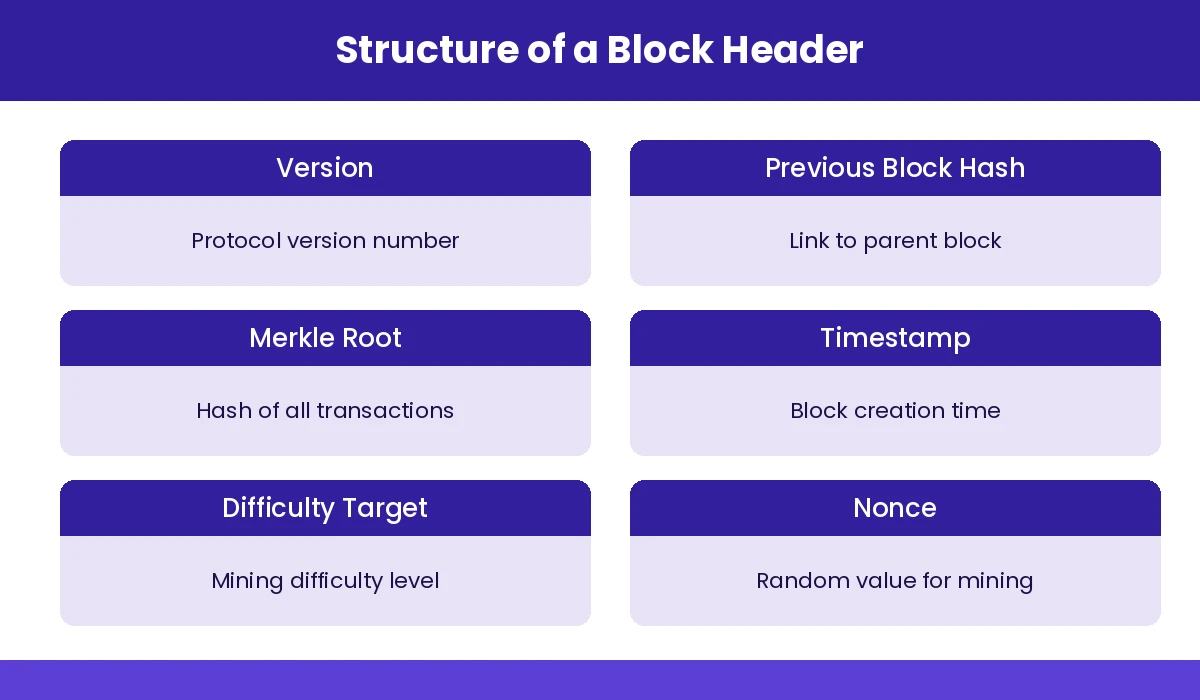
A block header is a section of a blockchain block that stores metadata about the block itself. Every single block on a blockchain has two main parts: the block body (which holds the actual transaction data) and the block header (which holds summary information about that block). The block header is relatively small compared to the block body, but it does the heavy lifting when it comes to security, validation, and linking blocks together.
According to Wikipedia’s overview of blockchain technology, each block in a chain contains a cryptographic hash of the previous block, a timestamp, and transaction data. All of that critical linking information lives inside the block header.
Here is a practical analogy. Imagine a library where every book has a special card glued to its cover. That card shows the book’s unique ID, the ID of the book that came before it on the shelf, a summary of its contents, and the exact date it was placed there. If someone tried to swap a book or change its contents, the card would no longer match, and the librarian would know immediately. That is essentially what a block header does for a blockchain.
Block headers are small enough that lightweight nodes (sometimes called SPV nodes, or Simplified Payment Verification nodes) can verify transactions without downloading the entire blockchain. This is a big deal for mobile wallets and applications that need to interact with the blockchain without storing terabytes of data.
The Structure of a Block Header: What Is Inside?
Every block header contains a set of fields that work together to keep the blockchain running smoothly. While the exact structure can vary slightly depending on the blockchain protocol, most block headers share the same core components. Let us walk through each one.
| Field | Size (Bytes) | Description |
|---|---|---|
| Version | 4 | Indicates which set of block validation rules to follow. When the protocol is upgraded, this number changes. |
| Previous Block Hash | 32 | A 256-bit hash pointing to the block that came before. This is the glue that holds the chain together. |
| Merkle Root | 32 | A single hash that represents all transactions in the block. Built using a Merkle tree data structure. |
| Timestamp | 4 | Records the approximate time when the block was created, stored as Unix epoch time. |
| Difficulty Target | 4 | Sets the threshold a valid block hash must meet. Adjusts periodically to control how fast new blocks are produced. |
| Nonce | 4 | A counter that miners change repeatedly to find a hash that meets the difficulty target. This is the trial-and-error part of mining. |
Together, these six fields add up to just 80 bytes. That is remarkably compact when you consider how much work those 80 bytes do. They verify the block, link it to the chain, summarize all its transactions, and provide the data miners need to compete for the right to add the block.
The previous block hash is especially critical. By referencing the hash of the block that came before, each block becomes permanently chained to its predecessor. If someone tried to go back and change a transaction in an older block, the hash would change, which would break the link, which would cause a cascade of mismatches all the way to the latest block. This is one of the main reasons why blockchains are considered tamper-resistant.
If you are interested in how mining difficulty is adjusted through these header fields, you can explore how mining difficulty in blockchain networks works and why it matters for block production timing.
The Role of Hash Functions in Block Headers
Hash functions are the engine behind block header security. A hash function takes any input, no matter how large or small, and produces a fixed-size output. In Bitcoin’s case, the SHA-256 algorithm is used, which always produces a 256-bit (64 character hexadecimal) output. Even a tiny change to the input results in a completely different hash. This property is called the “avalanche effect,” and it is what makes hash functions so useful for blockchain security.
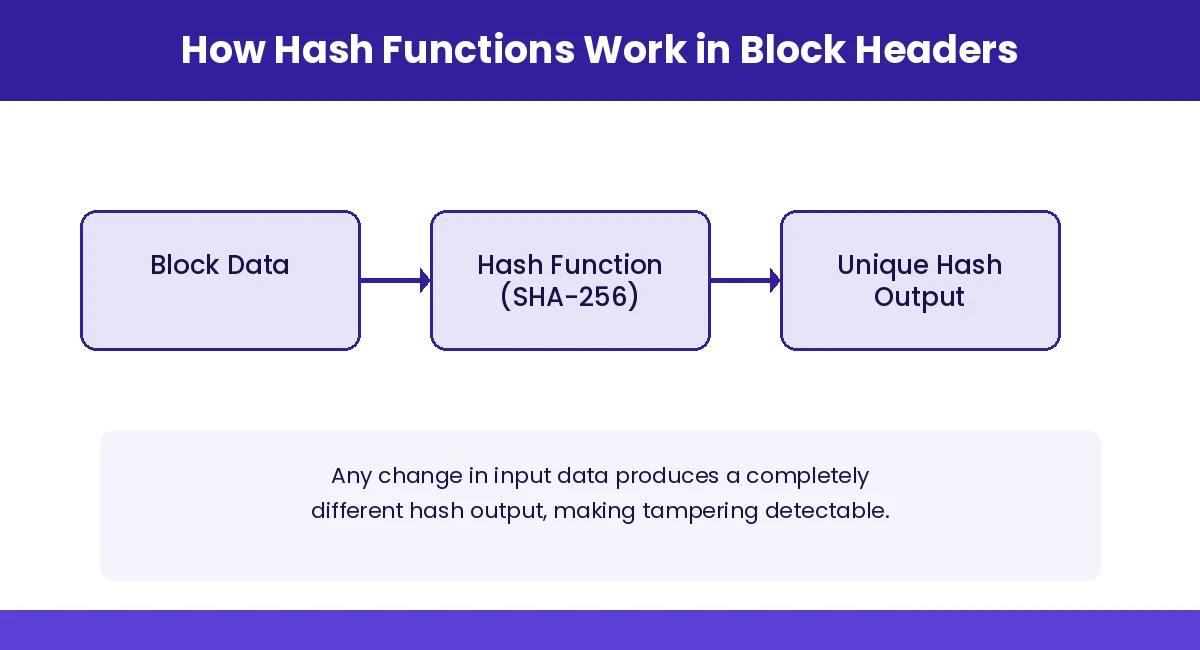
Here is a real-world example. Suppose a block contains 500 transactions. All 500 are hashed together using a Merkle tree to produce the Merkle root, which goes into the block header. If someone changes even a single digit in one transaction, the Merkle root changes. And since the Merkle root is part of the block header, the block header’s hash also changes. That mismatch immediately signals that something has been altered.
Hash functions in block headers serve several purposes. They create a unique identifier for each block. They link blocks together through the previous block hash field. They summarize all transactions through the Merkle root. And they provide the mathematical puzzle that miners must solve in Proof of Work systems.
Statement: Why Hash Functions Matter
Without hash functions, there would be no reliable way to detect unauthorized changes to blockchain data. Every security guarantee a blockchain provides, from immutability to trustless verification, depends on the mathematical properties of hash functions applied to block headers. They are not just a nice-to-have feature; they are the entire foundation of blockchain integrity.
For developers working on data verification systems within blockchain networks, understanding how real-world data oracles interact with on-chain data can provide deeper insight into how external information is validated before it ever touches a block header.
Block Headers and Blockchain Security
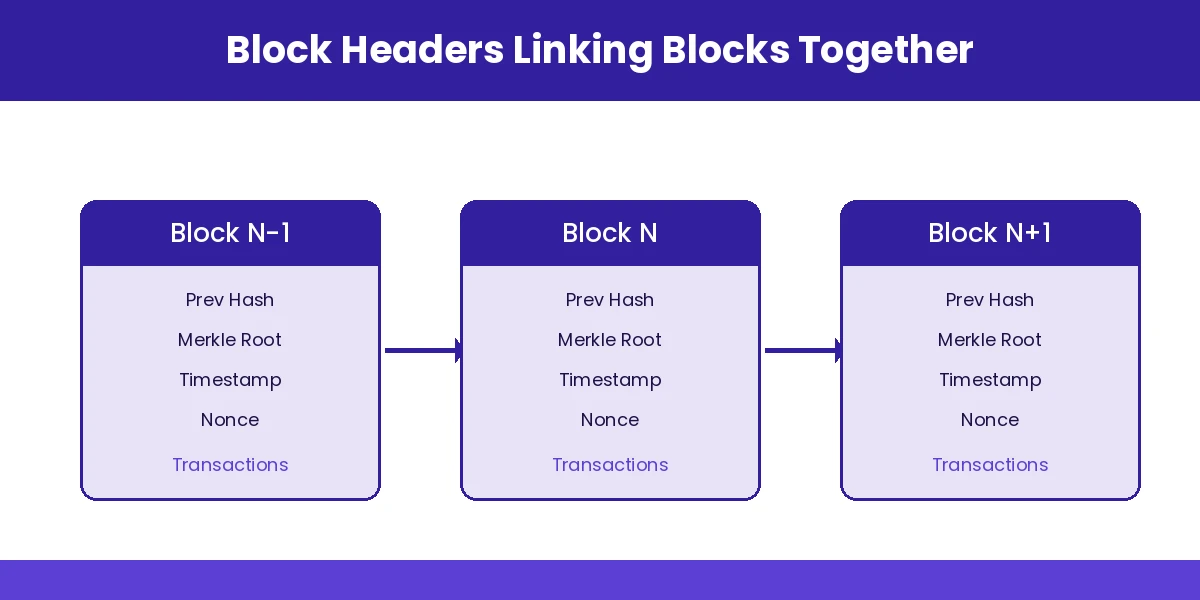
The security model of a blockchain is built on a simple but powerful idea: every block is connected to the one before it through a cryptographic hash stored in the block header. This creates a chain where altering any single block requires recalculating the hash of every subsequent block. On a large network like Bitcoin, where thousands of nodes hold copies of the blockchain, this kind of rewrite is practically impossible.
Let us say an attacker wants to change a transaction in block number 500,000. To do that, they would need to recalculate the hash for block 500,000, which changes the previous block hash stored in block 500,001, which then requires recalculating block 500,001, and so on, all the way to the most recent block. And they would need to do all of this faster than the rest of the network is producing new blocks. This is known as a 51% attack scenario, and on established networks, the computational cost makes it unfeasible.
The Life Cycle of Block Header Security
Block header security is not a one-time event. It follows a continuous life cycle that repeats with every new block added to the chain:
Transactions are collected and a new block body is assembled by a miner or validator.
The block header is constructed with the previous hash, Merkle root, timestamp, and other fields.
The nonce is adjusted repeatedly until the block header hash meets the difficulty target.
The valid block is broadcast to the network. Other nodes verify the block header independently.
The block is accepted and its hash becomes the “previous block hash” for the next block, continuing the cycle.
This cycle means that every new block added to the chain strengthens the security of all the blocks that came before it. The deeper a block is in the chain (the more blocks have been added after it), the harder it becomes to alter. This is why blockchain transactions are considered more “confirmed” as more blocks are added on top.
Understanding how this chain can sometimes break under certain conditions is also important. When disagreements arise about which blocks are valid, the result can be a chain split that impacts the entire blockchain ecosystem.
Build Secure Blockchain Solutions with Expert Guidance
Need a blockchain system with rock-solid security? Our team specializes in custom blockchain development with a deep understanding of block headers, consensus mechanisms, and network architecture.
Block Headers in Consensus Mechanisms
Consensus mechanisms are the rules that blockchain networks use to agree on which blocks are valid and should be added to the chain. Block headers play a central role in this process because they contain the data that consensus algorithms evaluate. Without block headers, there would be no standardized way for nodes to validate and agree on the state of the blockchain.
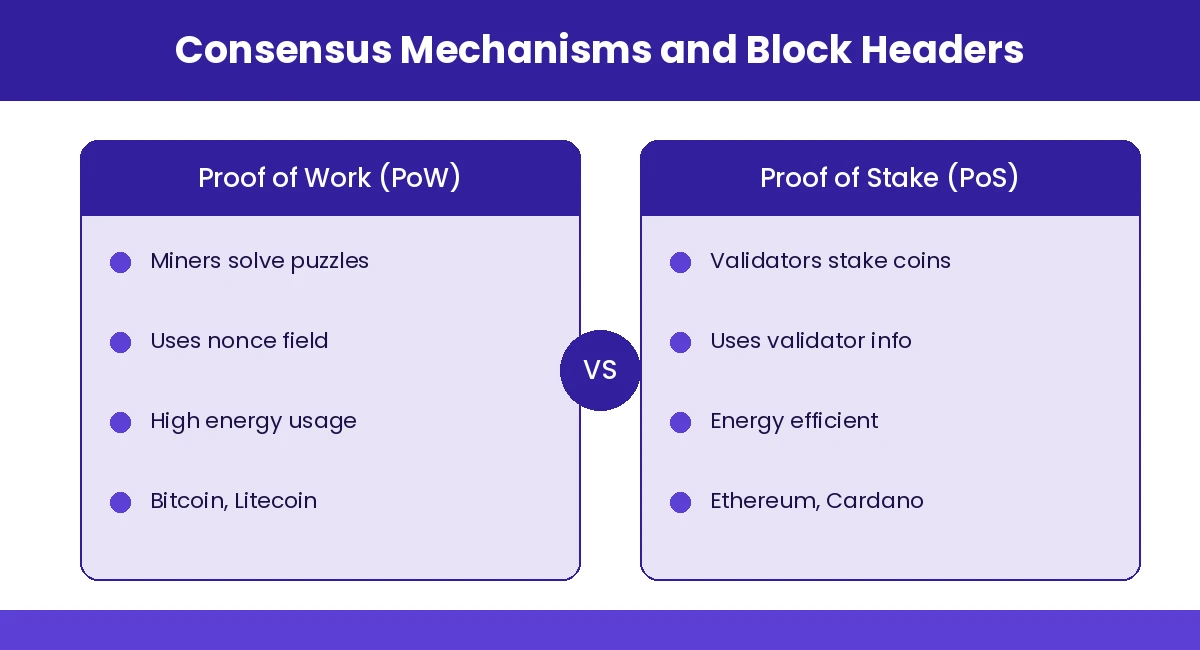
Proof of Work (PoW)
In a Proof of Work system like Bitcoin, miners take the block header and repeatedly hash it while changing the nonce value. The goal is to find a hash that falls below the difficulty target. This process requires enormous computational power, which is both a strength (it makes attacks expensive) and a weakness (it uses a lot of energy). The entire mining competition centers on the block header. Miners are not hashing the full block of transactions; they are hashing the 80-byte block header over and over until they find a valid result.
Proof of Stake (PoS)
Proof of Stake systems work differently, but block headers are still at the center. Instead of mining, validators are selected based on the amount of cryptocurrency they have staked. The selected validator proposes a new block, and other validators verify the block header to confirm it follows the rules. The block header still contains the previous hash, timestamp, and state information needed for validation. Ethereum’s switch from PoW to PoS in 2022 changed how blocks are produced, but block headers remain essential to the verification process.
| Feature | Proof of Work (PoW) | Proof of Stake (PoS) |
|---|---|---|
| Block Header Role | Hashed repeatedly to find valid nonce | Verified by validators against protocol rules |
| Nonce Field Usage | Actively modified during mining | Less critical; may be repurposed or simplified |
| Energy Consumption | Very high due to continuous hashing | Minimal, no competitive hashing required |
| Difficulty Target | Adjusts based on network hash rate | Not applicable in the same way; slot timing is fixed |
| Block Validation | Any node verifies the hash meets the target | Validators check signatures and header fields |
| Example Networks | Bitcoin, Litecoin, Dogecoin | Ethereum (post-Merge), Cardano, Solana |
Both consensus models depend on the integrity of block headers to function. The data in the header is what gets checked, validated, and agreed upon. Without accurate and verifiable block headers, consensus would be impossible, and the blockchain would have no way to maintain a single, agreed-upon version of the truth.
How Block Headers Interact with Network Nodes
Block headers do not exist in isolation. They are transmitted, verified, and stored by nodes across the blockchain network. When a new block is produced, the block header is the first piece of information that gets broadcast. Other nodes receive the header, verify its contents (checking the hash, the previous block link, the timestamp, and the difficulty), and then decide whether to download the full block body.
This is where the concept of lightweight verification becomes important. Full nodes download and store the entire blockchain, including all block bodies and headers. But lightweight clients, like the ones running on your phone, only need to download block headers to verify that transactions are legitimate. This is possible because the Merkle root in the header allows a technique called Merkle proof, where you can verify that a specific transaction is included in a block by checking a small number of hashes rather than the entire transaction list.
For developers building applications that communicate with the blockchain, understanding the role of RPC nodes in blockchain infrastructure is essential. RPC (Remote Procedure Call) nodes are the gateways through which applications query block headers, submit transactions, and interact with the network.
The efficiency of block header transmission is one of the reasons blockchain networks can scale to thousands of nodes worldwide. Instead of requiring every node to process every transaction immediately, the compact block header allows for quick initial validation. Only after a header passes verification does a node commit resources to download and process the full block.
Understanding the Merkle Root in Block Headers
The Merkle root deserves its own section because it is one of the most clever pieces of engineering in the block header. Named after Ralph Merkle, who patented the concept in 1979, a Merkle tree is a data structure where every leaf node represents a hash of a transaction, and every non-leaf node is a hash of its children. The single hash at the top is the Merkle root.
Why go through all this trouble? Because the Merkle root lets you verify the integrity of all transactions with a single 32-byte value stored in the block header. If any transaction in the block is changed, the Merkle root changes. But more importantly, the Merkle tree structure allows for efficient proofs. You can prove that a specific transaction is included in a block by providing just a handful of hashes (a “Merkle path”) rather than the full list of transactions.
Example: Merkle Root in Action
Suppose a block contains four transactions: T1, T2, T3, and T4. Here is how the Merkle root is calculated:
Step 1: Hash each transaction individually to get H1, H2, H3, and H4.
Step 2: Hash H1 and H2 together to get H12. Hash H3 and H4 together to get H34.
Step 3: Hash H12 and H34 together to get the Merkle root.
This single root value now represents all four transactions. If T3 changes, H3 changes, H34 changes, and the Merkle root changes. This cascade effect makes tampering immediately detectable.
In the context of enterprise blockchain applications, the Merkle root plays an even more critical role because businesses need to audit and verify large volumes of transactions efficiently. You can explore how this fits into broader enterprise use cases in our guide on enterprise blockchain applications.
Real-World Examples of Block Header Data
Looking at actual block header data makes the concept much more concrete. Let us examine what a real Bitcoin block header looks like. While the actual data is in hexadecimal format, we can break it down into readable components.
| Parameter | Example Value (Bitcoin Block #800000) |
|---|---|
| Version | 0x20000000 (version 2 with BIP signaling) |
| Previous Block Hash | 000000000000000000012117ad9f72c1c0e42227c2d042dca23e6b96bd9fbb55 |
| Merkle Root | Represents all ~3,700 transactions in the block as a single hash |
| Timestamp | July 24, 2023 (stored as Unix time: 1690168629) |
| Difficulty Target | Compact representation encoding the target hash threshold |
| Nonce | The specific value that, combined with other header fields, produced a valid hash |
What makes this interesting is that all of this data fits into just 80 bytes. A single block might contain thousands of transactions taking up over a megabyte, but its header is always exactly 80 bytes. This compact size is what allows lightweight nodes and mobile wallets to participate in the network without needing to download the entire blockchain.
Block Headers Across Different Blockchains
Not all blockchains use identical block header structures. While the core concept remains the same, different networks include different fields based on their specific needs and design choices. Here is how block headers differ across some major blockchain platforms.
| Blockchain | Header Size | Unique Header Fields | Consensus |
|---|---|---|---|
| Bitcoin | 80 bytes | Standard 6 fields (version, prev hash, Merkle root, time, bits, nonce) | PoW (SHA-256) |
| Ethereum | Variable (larger) | State root, receipts root, logs bloom, gas limit, gas used, extra data | PoS (post-Merge) |
| Litecoin | 80 bytes | Same as Bitcoin but uses Scrypt hashing | PoW (Scrypt) |
| Cardano | Variable | Slot number, VRF key, operational certificate, protocol version | PoS (Ouroboros) |
Ethereum’s block header is particularly interesting because it includes additional fields like the “state root,” which represents the entire state of all accounts and smart contracts on the network. This is necessary because Ethereum is not just a payment network; it is a full computing platform. The block header needs to capture more information to reflect the broader scope of what happens in each block.
Emerging technologies like AR, VR, and metaverse platforms are also beginning to interact with blockchain infrastructure, which means block header designs may need to adapt to handle new types of data and verification requirements. Learn more about the intersection of AR, VR, and blockchain in the metaverse.
Future Trends and Innovations in Block Header Design
Blockchain technology is evolving rapidly, and block headers are evolving with it. Several key trends are shaping the future of how block headers will be designed and used.
Sharding and Block Headers
Sharding involves splitting a blockchain into smaller pieces called “shards,” each capable of processing transactions independently. This requires significant changes to block header design. Instead of a single chain with one set of block headers, a sharded blockchain needs a way to coordinate headers across multiple shards. The main chain (sometimes called the beacon chain) must include references to the state of each shard, which means block headers on the main chain become more complex.
Ethereum has been working toward a sharded architecture, and the design of shard block headers is a major area of research. Each shard would have its own block headers, but the beacon chain’s block headers would include “crosslinks” that reference the latest state of each shard. This creates a hierarchical header structure that did not exist in earlier blockchain designs.
Layer-Two Solutions
Layer-two solutions like rollups (both optimistic and zero-knowledge) change the relationship between transactions and block headers. In a rollup, transactions are executed off the main chain, but a compressed summary is posted back to the main chain. The block header on the main chain needs to account for this summarized data. For zero-knowledge rollups, the block header might include a validity proof that mathematically proves all the off-chain transactions were executed correctly, without revealing the details of each transaction.
Cross-Chain Interoperability
As the blockchain ecosystem becomes more fragmented across multiple networks, the need for cross-chain communication grows. Block headers play a role here too. Cross-chain bridges often work by verifying block headers from one chain on another chain. A smart contract on Ethereum might verify a Bitcoin block header to confirm that a transaction happened on the Bitcoin network. This means block header formats need to be well-documented and verifiable across different platforms.
Header Compression and Optimization
As blockchains grow, the cumulative size of block headers becomes a storage and bandwidth concern. Research into header compression techniques aims to reduce the overhead of storing and transmitting headers without sacrificing security. Techniques like compact block relay (already used in Bitcoin) allow nodes to reconstruct blocks from minimal header information plus a shortlist of transaction IDs, reducing the amount of data that needs to travel across the network.
Ready to Build Your Blockchain Project?
From block header design to full-scale blockchain architecture, our development team has the expertise to bring your vision to life. Secure, scalable, and built for performance.
Common Misconceptions About Block Headers
There are a few misunderstandings about block headers that are worth clearing up.
First, some people think block headers contain the actual transaction data. They do not. The block body holds the transactions. The block header holds the Merkle root, which is a hash summary of those transactions, but not the transactions themselves. This distinction matters because it is what makes lightweight verification possible.
Second, some assume that changing the nonce is the only thing miners do during mining. While the nonce is the primary variable that miners adjust, there are situations where the nonce space gets exhausted (all 4 billion possible nonce values have been tried without finding a valid hash). When this happens, miners change other parts of the block (like the coinbase transaction or the timestamp) to create a new starting point, which changes the Merkle root in the header, giving them a fresh set of 4 billion nonces to try.
Third, not all blockchains use the same block header format. As we discussed earlier, Ethereum’s block header is significantly more complex than Bitcoin’s because it needs to track the state of smart contracts and account balances, not just transaction history.
Why Block Headers Matter for Blockchain Developers
If you are building on a blockchain, you will interact with block headers whether you realize it or not. Every time your application queries the latest block, verifies a transaction, or checks the state of the network, block headers are involved behind the scenes.
For developers working on custom blockchain solutions, block header design is one of the most important architectural decisions. The fields you include in your block header determine what your blockchain can do, how it validates blocks, and how lightweight clients interact with it. A poorly designed block header can lead to inefficiencies, security vulnerabilities, or scalability bottlenecks.
Understanding block headers also helps with debugging and monitoring. If a block is rejected by the network, the reason usually traces back to something in the header: an incorrect previous block hash, an invalid timestamp, a hash that does not meet the difficulty target, or a Merkle root that does not match the transactions. Knowing how to read and interpret block headers is a fundamental skill for any blockchain developer.
For a broader understanding of how blockchain development fits into enterprise-level applications, our comprehensive guide to enterprise blockchain applications covers the full spectrum of what is possible with this technology.
Frequently Asked Questions
A block header is the metadata section at the top of each block in a blockchain. It contains essential information like the previous block hash, Merkle root, timestamp, nonce, and difficulty target. The block header is important because it links each block to its predecessor through cryptographic hashes, which is what makes the blockchain tamper-resistant. Without block headers, there would be no way to verify the integrity of individual blocks or maintain the chronological order of the entire chain.
The Merkle root is a single hash that represents all the transactions in a block. It is calculated by pairing and hashing transaction hashes in a tree structure until only one hash remains. This allows anyone to verify whether a specific transaction is included in a block without downloading all the transactions. You only need the Merkle root from the block header and a small set of hashes called a Merkle path to confirm inclusion, making verification both fast and storage-efficient.
The block header and block body serve different purposes. The block body contains the actual transaction data, which can range from a few transactions to several thousand depending on the blockchain. The block header, on the other hand, stores metadata about the block: a hash of the previous block, a summary of transactions via the Merkle root, a timestamp, and mining-related data like the nonce and difficulty target. The header is just 80 bytes in Bitcoin, while the body can be over a megabyte.
Block headers prevent tampering through a cryptographic chain. Each block header contains the hash of the previous block header. If someone changes even a single byte of data in an older block, that block’s hash changes, which breaks the link to the next block. To hide the change, the attacker would need to recalculate every block header hash from the altered block all the way to the latest block, while competing against the entire network. This makes retroactive changes practically impossible on established chains.
No, different blockchains use different block header structures based on their design and purpose. Bitcoin uses a compact 80-byte header with six fields. Ethereum includes additional fields like state root, receipts root, gas used, and extra data because it tracks smart contract states as well as transactions. Cardano uses slot numbers and VRF keys in its headers. While the core concept of linking blocks through header hashes is shared, the specific fields and sizes vary based on what each blockchain needs to track and validate.
The nonce is a 4-byte number in the block header that miners change repeatedly during the mining process. In Proof of Work blockchains like Bitcoin, miners hash the block header and adjust the nonce each time until the resulting hash falls below the network’s difficulty target. Since there are roughly 4 billion possible nonce values, miners cycle through them rapidly. If no valid hash is found, miners modify other data like the timestamp or coinbase transaction to reset the nonce space and try again.
Reviewed & Edited By

Aman Vaths
Founder of Nadcab Labs
Aman Vaths is the Founder & CTO of Nadcab Labs, a global digital engineering company delivering enterprise-grade solutions across AI, Web3, Blockchain, Big Data, Cloud, Cybersecurity, and Modern Application Development. With deep technical leadership and product innovation experience, Aman has positioned Nadcab Labs as one of the most advanced engineering companies driving the next era of intelligent, secure, and scalable software systems. Under his leadership, Nadcab Labs has built 2,000+ global projects across sectors including fintech, banking, healthcare, real estate, logistics, gaming, manufacturing, and next-generation DePIN networks. Aman’s strength lies in architecting high-performance systems, end-to-end platform engineering, and designing enterprise solutions that operate at global scale.




